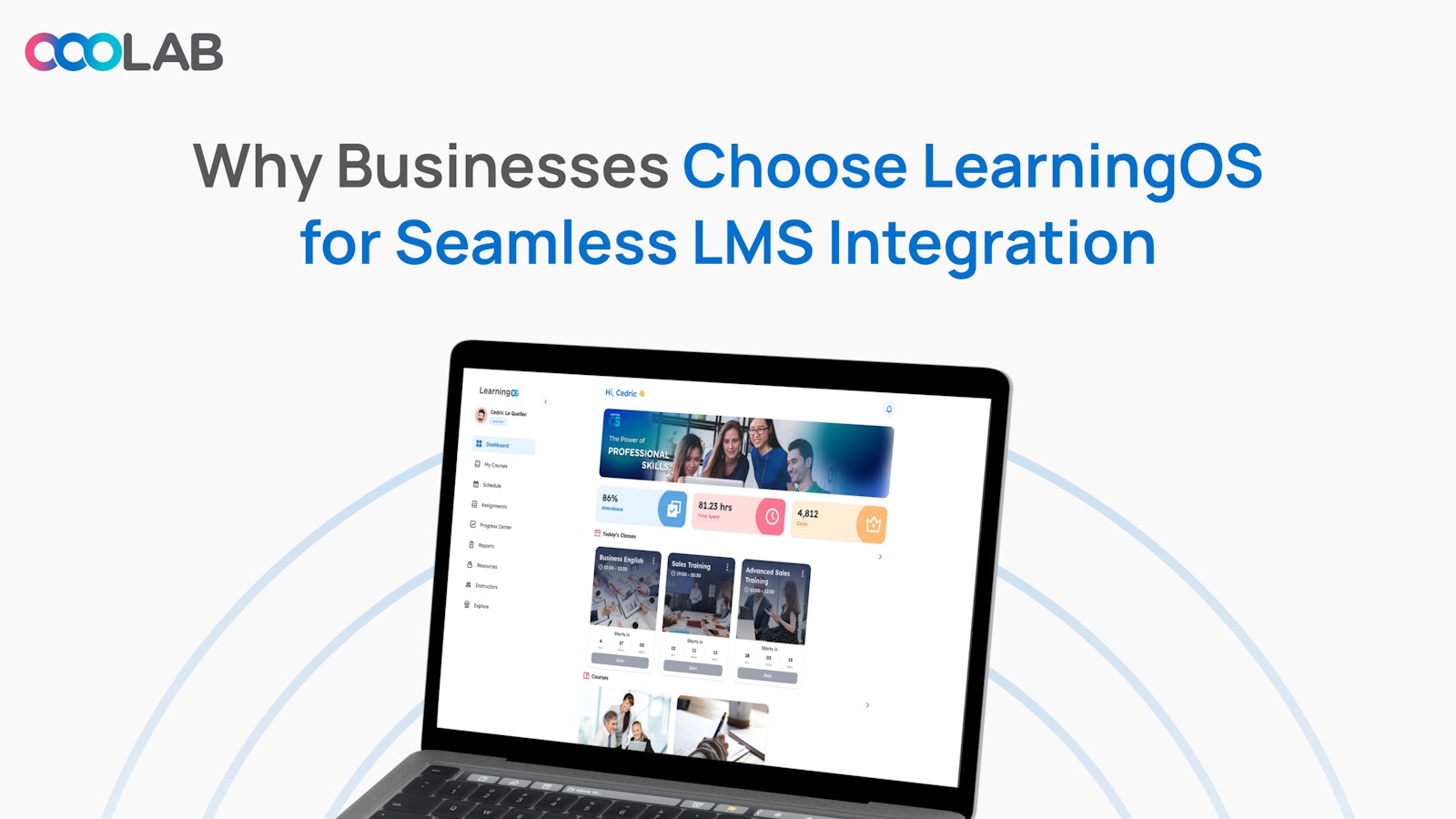

As the demand for digital learning solutions continues to grow, businesses increasingly rely on Learning Management Systems (LMS) to facilitate employee development, compliance training, and upskilling. However, implementing an LMS that aligns with existing enterprise infrastructure is a complex process. Seamless LMS integration ensures that the learning platform complements existing workflows, reduces disruptions, and maximizes ROI.
OOOLAB has emerged as a trusted partner for businesses seeking tailored LMS integration solutions. By combining cutting-edge technology with a deep understanding of enterprise needs, OOOLAB delivers results that redefine the learning experience. This article explores why businesses choose OOOLAB for LMS integration, supported by industry data, authoritative references, and real-world examples.

Integrating an LMS into an enterprise environment involves more than just deploying software. Businesses must ensure compatibility with their existing systems, such as Human Resource Management Systems (HRMS), Enterprise Resource Planning (ERP) tools, and Customer Relationship Management (CRM) platforms. Without seamless integration, companies risk operational inefficiencies and low user adoption rates.
According to a comprehensive report by Ellis, Ryann K. (2024) [1], an overwhelming 41% of organizations face significant challenges when attempting to integrate a new Learning Management System (LMS) with their existing enterprise systems. This statistic highlights the critical importance of compatibility, as misaligned systems can lead to inefficiencies, data silos, and increased costs.
Furthermore, a comprehensive study by Oxagile [2] highlights the significant advantages of seamless LMS integration. Businesses with effectively integrated LMS platforms report completing major training initiatives in nearly half the time compared to those using disconnected systems. Additionally, these organizations see an average increase of over 10 hours of productive work per employee each month, thanks to improved training workflows and reduced administrative burdens. This efficiency not only accelerates strategic goal achievement but also fosters a culture of continuous learning and adaptability.
Besides, according to a report by Fortune Business Insights, the global LMS market size reached $16.19 billion in 2022 and is expected to grow at a compound annual growth rate (CAGR) of 14.2% between 2023 and 2030. This growth reflects the increasing importance of integrated learning ecosystems for enhancing employee skills and organizational productivity. Source: Fortune Business Insights.
The necessity of seamless integration is echoed by industry thought leaders. An expert from McKinsey & Company explains, “The true value of an LMS lies in its ability to blend seamlessly into everyday operations.” This statement underscores the role of technology as an enabler rather than a disruption. For businesses to truly capitalize on the potential of an LMS, the system must align with existing tools such as HR management platforms, CRM systems, and ERP software, ensuring smooth data flow and operational efficiency.
LearningOS by OOOLAB is designed to overcome the common hurdles businesses face when deploying LMS systems. By focusing on seamless integration and scalability, LearningOS empowers organizations to maximize the potential of their workforce.
LearningOS leverages an API-first architecture that simplifies integration with enterprise software. By supporting standards such as xAPI and SCORM, the platform ensures compatibility with existing content while enabling advanced tracking of learner progress.
A study by Phillipo and John (2018) [3] shows that businesses using API-based LMS platforms experienced a 24% reduction in implementation time compared to traditional systems. LearningOS exemplifies this efficiency, allowing organizations to focus on strategic training goals rather than logistical hurdles.
“LearningOS is not just a tool, it’s an adaptable framework that aligns with our evolving business needs,” remarked Mark Jensen, CTO of a Fortune 500 retail company.
According to a report by Statista, 48% of organizations using scalable LMS platforms reported increased learner engagement within the first year. Scalability is a cornerstone of LearningOS, allowing organizations to expand their training programs as they grow. Whether onboarding new hires across multiple locations or launching global compliance initiatives, LearningOS adapts to diverse requirements without compromising performance.
LearningOS incorporates AI-driven algorithms to create customized learning paths, ensuring that employees receive relevant training aligned with their roles and skill levels. This personalized approach boosts engagement and retention. A report by Gartner revealed that companies employing AI-driven LMS solutions observed a 30% increase in learner satisfaction. Furthermore, employees trained through personalized modules were 40% more likely to apply new skills in their daily tasks.
LearningOS provides real-time dashboards that consolidate data from multiple systems, offering actionable insights into learner progress, course effectiveness A survey conducted by Jones, Kyle M. L. (2019) [4] found that organizations using LMS platforms with advanced analytics improved decision-making by 48%, as they could identify skill gaps and adjust their training strategies accordingly.
In industries such as healthcare, finance, and manufacturing, compliance is non-negotiable. LearningOS adheres to global standards, including GDPR, ISO 27001, and HIPAA, ensuring robust data security.
LearningOS integrates gamified elements such as badges, leaderboards, and performance-based rewards to enhance learner motivation. This approach aligns with findings from TalentLMS, which reported that gamified learning environments led to a 72% increase in learner engagement.
The decision to implement an LMS is not just about choosing a tool, it’s about ensuring that the tool adds value across multiple dimensions of the organization. LearningOS achieves this through its unique blend of efficiency, adaptability, and forward-thinking technology, making it a powerful choice for businesses seeking to elevate their training and development strategies.
LearningOS automates repetitive tasks such as course assignments, certification tracking, and data reporting. Its ability to seamlessly synchronize data across platforms eliminates redundancies, allowing administrators to focus on strategic initiatives rather than mundane operational tasks. The integration of LearningOS with ERP systems reduces manual entry errors and streamlines workflows. Tasks that previously took hours can now be accomplished within minutes.
For example, Shopee company leveraging LearningOS to automate its onboarding process reported significant results. Employee onboarding time was cut by 35%, and the company saved $1.2 million annually by reducing paperwork and optimizing training schedules. Additionally, the organization saw a 15% reduction in attrition rates among new hires, attributed to faster skill acquisition and higher engagement during the onboarding phase.
LearningOS goes beyond delivering courses, it actively enhances employee performance by aligning training with individual and organizational goals. Personalized learning paths ensure that employees gain the exact skills needed for their roles, while progress tracking provides real-time insights into competency development.
For instance, Maison Retail Management International, a retail company, has used LearningOS to train its salesforce, focusing on product knowledge and customer interaction skills. Here are the results over six months in 2023:
- Sales representatives trained through LearningOS closed 30% more deals than their peers.
- Monthly sales revenue increased by 20%.
- Employee feedback surveys showed a 90% satisfaction rate with the platform's ease of use and relevance.
LearningOS’s integration with AI tools represents its commitment to staying ahead of the curve. These technologies enable features such as:
- Automated content creation tailored to learner profiles.
- Predictive analytics to forecast skill gaps and suggest relevant training.
- Intelligent recommendations for continuous learning.
As businesses face rapid technological advancements, LearningOS ensures that their training infrastructure evolves alongside these changes. A study by PwC highlighted that companies adopting AI-driven LMS platforms like LearningOS were 33% more likely to retain top talent due to enhanced learning experiences.
The future of LMS solutions lies in adaptability and innovation, and LearningOS embodies both. As organizations continue to adopt advanced AI-driven tools, LearningOS is positioned to lead the charge by offering features that merge cutting-edge technology with practical usability.
With AI integration, LearningOS can:
- Generate training materials dynamically based on learner profiles.
- Analyze vast datasets to recommend tailored learning solutions.
- Adapt to evolving industry standards and trends without requiring major overhauls.
While leveraging technology, LearningOS maintains a strong focus on user experience. Its intuitive interface, mobile compatibility, and multilingual support make it accessible to diverse workforces.
“In LearningOS, we’ve found a partner that not only meets our current needs but also prepares us for future challenges,” remarked Dr. Emily Carter, a seasoned Learning and Development Consultant. Her comment underscores the platform’s ability to act as a bridge between present requirements and future aspirations.
In today’s fast-paced business environment, an LMS must be more than just a platform, it must be a strategic enabler. LearningOS by OOOLAB exemplifies this by combining seamless integration, robust analytics, and innovative AI-driven features.
For businesses seeking to empower their workforce and future-proof their training initiatives, LearningOS emerges as a transformative choice. Its impact is evident across industries, from driving efficiency and reducing costs to enhancing productivity and engagement.
To learn more about how LearningOS can revolutionize your organization's learning and development strategy, visit OOOLAB’s official website.
[1] Ellis, Ryann K. (2024), Field Guide to Learning Management, Quora, archived from the original on 24 August 2014, retrieved 5 July 2012.
[2] "History and Trends of Learning Management System (Infographic)". Oxagile. 12 April 2016.
[3] Phillipo, John (27 June 2018). "LMS: The Missing Link and Great Enabler". NanoPDF. Retrieved 10 May 2022.
[4] Jones, Kyle M. L. (2 July 2019). "Learning analytics and higher education: a proposed model for establishing informed consent mechanisms to promote student privacy and autonomy".